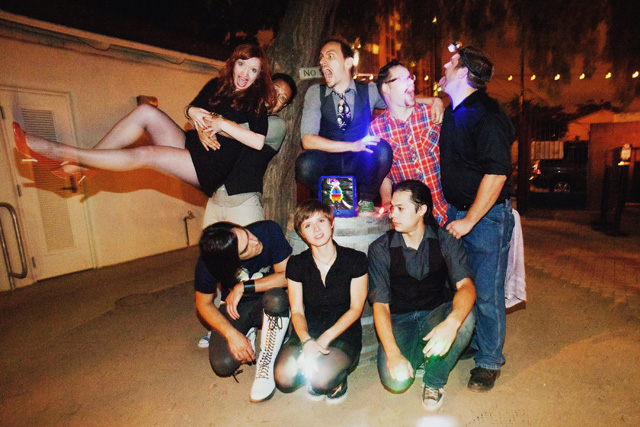There’s such a thing as being a diverse band—then there’s Curious Quail, whose members don’t seem to know what kind of music they play.
“People ask me what the band sounds like, and I say it depends on the album—or whether it’s live,” singer/songwriter Mike-Shirley Donnelly says.
Initially, that live sound was Shirley-Donnelly playing solo—a sort of weird, one-man acoustic-guitar-meets-laptop project, which eventually morphed into a six-piece indie-folk jamboree. Yet Shirley-Donnelly does still play some shows solo as an electronic-folk singer.
The first EP, The Glow, reflected that one-man sound. Then there was the long awaited full-length debut, Instant Gratification, which was released in June of 2012. It represents the full band’s live sound yet is loaded with electronic sounds and drum machines—unlike the live sound.
It’s no wonder it took Shirley-Donnelly so long to finish an album that was already half-written nearly two years ago—there are so many options for how to execute each song. With each passing year, he only adds more possibilities to his styles.
Shirley-Donnelly started out by demo-ing every song on Instant Gratification himself, thinking he would release these recordings. As people joined the band, he add their parts to the mix. In several instances, he even scrapped entire versions of songs and started over. “Survivor’s Guilt,” for instance, went from being an electronic-pop number to a power-pop indie-rock song with heavy guitars and lightly textured pianos.
“When you’re doing stuff with yourself, it’s a totally different experience,” Shirley-Donnelly explains. “Joey’s drum parts really helped shape what the song turned into. It needed Joey’s drums. It needed the fuzzy guitars.”
When Shirley-Donnelly started Curious Quail in 2008, the songs weren’t as fluid. Shirley-Donnelly would play an acoustic guitar, keyboards and effects on his loop pedals, all while performing over backing tracks on his laptop. Everything had to be very precise, or it would all fall apart.
“It was super neat, but it was super stressful,” Shirley-Donnelly says. “If you hit the wrong pedal, then suddenly you’re in the verse.”
The Glow, which was released in 2009, matched his live shows exactly, which Shirley-Donnelly thought took some of the steam out of his performances.
“If you’d heard the album, there wasn’t too much to gain from seeing it live,” he says. “It was a lot of the same sound effects. It was kind of static audio-wise. There was no real room for fluctuation or improvisation. That aspect of it was frustrating.”
The band came together almost by accident. Joey Guthrie, a friend, asked if he could sit in on drums during a set. He was quickly followed by Sean Nolen (guitar) and Alan Chen (violin). Greg Keeney (keyboards) later joined the band, followed by Steve Garber (bass).
“The band happened to me. It all sort of crept up on me,” Shirley-Donnelly says.
As Shirley-Donnelly wrote Instant Gratification, he not only allowed himself to make a full-band album, he completely changed his sound. Instant Gratification is upbeat and fun, while The Glow is downright somber and depressing. But both albums evince equally dark lyrics. Shirley-Donnelly liked the unpredictability of having the music and words not match in an obvious way.
“It catches you off-guard,” Shirley-Donnelly says. “Anytime you’re not prepared for something, it’s going to hit you a little harder. You listen to it, and you’re like, ‘This is really fucking sad, but musically it’s trying to tell me something different.'”
One song, “Something Under the Bed Is Drooling,” for instance, is about suicide. Musically, however, it is a bouncy rocker offset with a pretty violin part.
Shirley-Donnelly has always been drawn to dark lyrics, despite being a generally upbeat person. “It’s not like I’m necessarily a very dark person, but I’ve seen some pretty horrific stuff,” he says. “I try to be positive no matter what. It’s not like I’m at home cutting myself in a bathtub. Bad shit happens, and there’s no reason to cover it up.”
Just as Shirley-Donnelly mixes lots of competing elements in his instrumentation, the juxtaposition of the music and lyrics helps to create a more complex experience. The result, according to Shirley-Donnelly, is ultimately better than a singular, overt mood.
“The concept of the album is ‘Things can get really bad, but they also can get better.’ The underlying aspect of the whole album is hope,” Shirley-Donnelly says.
.Curious Quail Mixes Styles With 'Instant Gratification'




